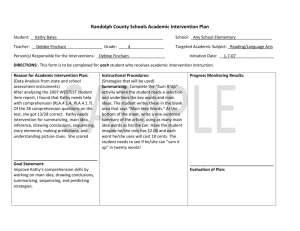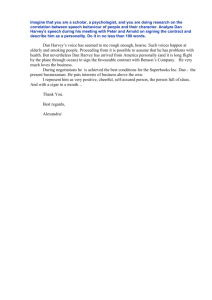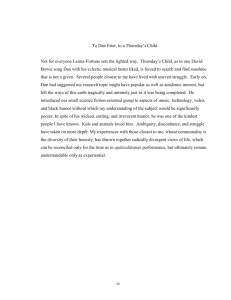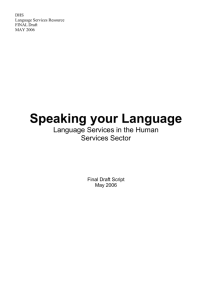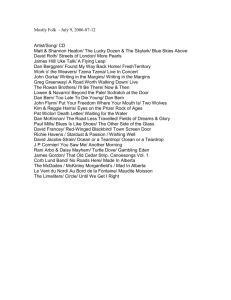using technology to overcome distance
advertisement
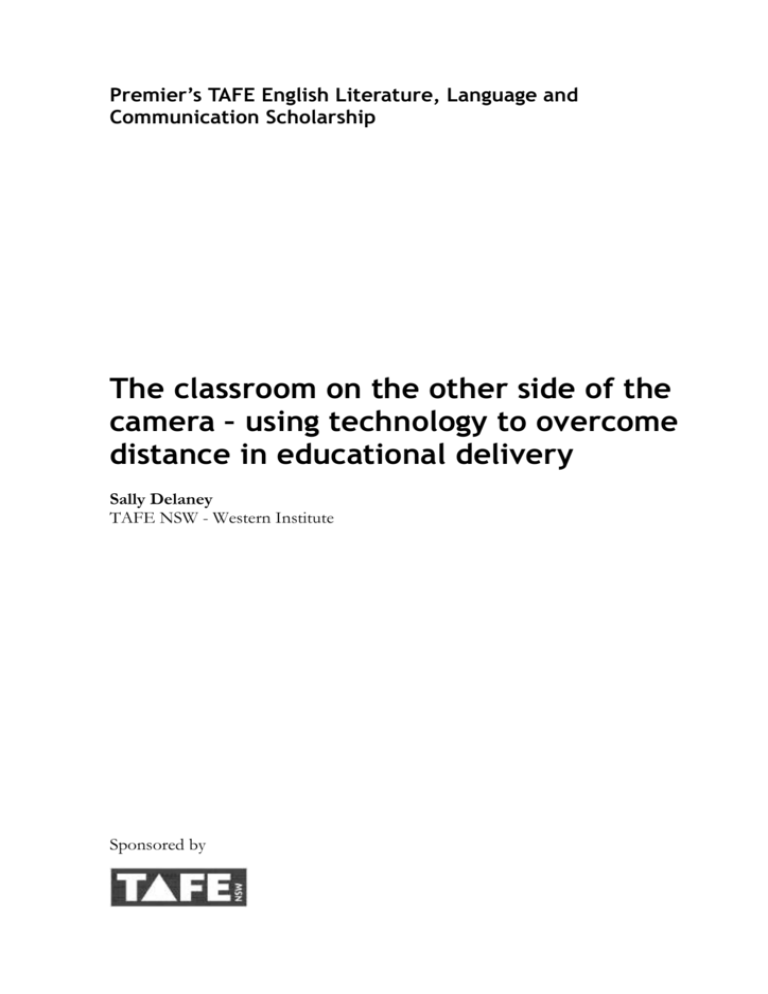
Premier’s TAFE English Literature, Language and Communication Scholarship The classroom on the other side of the camera – using technology to overcome distance in educational delivery Sally Delaney TAFE NSW - Western Institute Sponsored by One of the highlights of my teaching career has been receiving the 2006 Premier’s TAFE English Literature, Language and Communication Scholarship. At the time of being informed that I had received the award, I was delighted to think that my extensive efforts in preparing the application had been rewarded. What I know now is that this stage was merely the beginning of an incredible journey of learning and professional development – an opportunity of a ‘teaching’ lifetime. Focus of the study The broad focus of my proposed study was to examine aspects of blended delivery1 models of education in the United States of America which better service students’ needs in the area of English Literature, Language and Communication. The time frame was four weeks during April-May 2007. The particular focus of the study was: the incorporation of e-learning technologies such as videoconferencing and online study for distance learners how these tools of delivery might improve student access, participation, engagement, learning outcomes and completion rates for vocational training and education. the strategies used to train and mentor staff using e-learning technologies in blended models of learning. Significant Learning A learning experience: Iowa Distance Learning Association Annual Conference I had the great experience of attending two seminars delivered by William A. Draves who is a quoted expert on lifelong learning and online learning. Bill is the president of the Learning Resources Network (LERN) www.lern.org and authored several books. William A.Draves and Sally Delaney, IDLA Conference, Cedar Rapids, Iowa Bill's first seminar focused on 'a different kind of teacher' for the new teaching environment. Today's teacher needs to respond to individual learning styles; to focus on outcomes and knowledge; find strengths in the individual's skills; be aware that there are different learning styles for the different generations. 1. Blended delivery is a non-traditional teaching/learning model. It can be defined as distance educational delivery which incorporates a variety of teaching methods and tools. These may include print-based learning material, online delivery, videoconferencing teaching/learning, face to face support and telephone support. In the second seminar, Bill explained the generational learning styles: the veterans <1946; the baby boomers (1946 – 64); Generation X (1965- 1979); and Generation Y (19802000). The latest generation > 2000 hasn't been named as yet. The point about the learning style is that each generation has lived through a particular time where things are done or thought in a particular way. Bill gave some excellent tips for teaching Gen Y one of which was to 'make learning relevant'. Conference Day 2 - Main day of Conference Bill Draves gave the keynote address entitled "Nine Shift: Work, Life and Education in 21st Century" www.nineshift.com. This address focused on how the internet is changing how we live and that by 2020 a way of life as we once knew it will be over - the internet will be predominant. In the afternoon I delivered my presentation "Distance Education An Australian Perspective" in a breakout session to a small group of interested and interesting educators. Two of the participants at the session are very keen to set up videoconference session between our students and theirs! I attended another breakout session on the latest digital tools for teaching: digital pens; ebooks which have an embedded video chip; dynamic software demonstrating calculus and trig; virtual calculators; tablet PCs. I also saw a portable digital whiteboard system demonstrated, which is a cheaper option to smartboard www.mimio.com. I was delighted to be present at the Conference and be welcomed so warmly by a great group of people. Thank you to Donna for liaising with me to help me coordinate my attendance at the Conference. A learning experience: Videoconferencing and all things e-learning My contact in Wisconsin was Dan Gross. Dan is the Executive Director of SWING (Southeastern Wisconsin Instructional Network Group) www.swing.k12.wi.us. Dan coordinates communication technologies in many K-12 schools and other institutions in this area. He also works with the Museums to bring schools and museums together. We drove through different areas: tourist, farming, industrial with Dan acting as a wonderful guide. We also discussed all manner of things American including education, technology, politics, religion, culture, food and Boy Scouts! I gained a marvellous insight into one perspective of life and times in Wisconsin thanks to Dan's depth of knowledge, educated opinions and sense of humour. Our first stop was Carthage College www.carthage.edu where Dan introduced me to Prisca`Moore, Associate Professor of the Teacher Education program. Prisca focuses on a variety of technologies in the program including videoconference training. These students then on completion can be leaders in the fields of instructional technologies. The student teachers combine with school children in videoconferencing sessions which include programs from NASA and museums. These sessions then act as models for the student teachers. We also visited the Gateway Technical College in Burlington. Here Dan introduced me to Kathy and Gerry who are instructors in the Adult Learning Centre. Kathy and Gerry deliver ESL and the GED (which is very similar to CGVE – a TAFE NSW Year 10 equivalent course). Dan put an enormous amount of effort and energy into my visit. It was a fantastic day and such an excellent opportunity to learn about the how, what and why of education. Dan’s innovative and enthusiastic approach to education can only enhance communication technology within the system. A learning experience: Blended learning meets technology meets true hospitality My visit was to Illinois Central College was coordinated by Patrice Hess, Director of Organisational Learning, who unfortunately was unavailable on the day of my visit. Patrice left me in the hands of Janice Kinsinger, Associate Dean Instructional Innovation and Learning Resources. We began at 9am with an informal meeting with Instructional Technology and English Faculty. Stimulating discussion followed regarding Distance Learning, and in particular online learning. Two motivating forces drive the growth of online courses: competition and student demand. Teachers are placing more and more courses online to meet the demands. The technology infrastructure at the College was amazing. If you opt to place a course online, there are specialists to help you. I was then given a tour of the technology studio. This centre services the College for all of the videoconferencing. Janice and I then took part in a videoconference to downtown Peoria Campus with educators involved in Health Careers and Public Services. The video-conference system is housed in a 'smart' classroom with touch screen control and drop down large screen. I was then invited to attend a Curriculum Committee Meeting were I was once again warmly welcomed and which provided an interesting insight into how this works. A final session of a 'Blackboard' training program was my last session for the day. 'Blackboard' is the Learning Management System (ie Janison Toolbox) which appears to be preferred here. Apart from the learning about all things relating to Distance Learning, I also experienced hospitality and friendliness that is definitely first class. Nothing seems too much effort; hard work is the norm; pride in your institution and love of your jobs are commonplace. Learning experience: research into online learning Purdue University, West Lafayette, Indiana, first opened its doors in 1874 with 39 students. It now enrols 40 000 students and is a beautiful Campus which covers 2 300 acres. One of its esteemed graduates is Neil Armstrong www.purdue.edu. My contact at Purdue was Dr Jennifer Richardson, Assistant Professor in the Educational Technology Program. Jennifer is in charge of the teacher education program. Jennifer and her colleagues have completed extensive research in distance learning especially online learning and videoconferencing. Jennifer is currently researching peer feedback in the online environment, specifically the discussion room. Dr Jennifer Richardson and Sally Delaney, Purdue University, West Lafayette, Indiana Jennifer provided me with a paper relating to videoconferencing which I know will provide some wonderful research information for us. Learning experience: ‘inquire, learn and reflect’ Kent State University in Ohio is Ohio's second largest University with a total student body of 38 000. It was first established as a public university 94 years ago. Part of the history of the University includes a shocking student massacre. On May 4, 1970, protests against the Vietnam War ended in confrontation with the Ohio National Guard, leaving four students dead and nine wounded. A memorial to this incident in the University grounds encourages all who visit to 'inquire, learn and reflect' on how differences may be resolved peacefully. My visit to the University allowed me the opportunity to learn about and witness current research into technology in the classroom. Dale Cook, Summit Professor, Founder and Director, Research Centre for Educational Technology, met me and explained the work that the Centre is doing (www.rcet.org). RCET 'explores the uses and influences of technology in education through rich collaborations among researchers and practitioners, to help improve teaching and learning in today's classroom ...'. Live research takes place in an authentic classroom setting which can be viewed, recorded and analysed by researchers through a one-way screen. Groups of students from K-12, along with their teacher, are brought to the classroom for a six week period. The students are provided with state-of-the-art technology in the classroom. I viewed a Kindergarten class working with their teacher on a unit on weather. They were using microphone, document camera, lap top computers, weather probes, and video/still cameras as tools for their learning. It was a fantastic sight to see! These were children who did not have a lot of technological skill at the commencement of their six week period. Two research findings which Dale discussed with me are: the low incidence of behaviour problems in this technology rich classroom; the enhancement of skills for students with special needs. I then spent some time with Albert (Chip) Ingram and Lin Lin, both of whom are Associate Professors, Educational Foundations and Special Services. We had a rich and interesting conversation regarding online and blended learning. They showed me the Distance Learning Centre which is equipped with 'smart classroom' features. I was in awe of the level and capacity of research that has been set up at Kent State. Learning experience: E-learning in New York I met with Alison Rice, at Hunter College, City University of New York. This is a University right in the heart of Manhattan - just a buzz of students and life. Alison is the Director of Hunter College's IELI (International English Language Institute) and ELT (English Language Teaching) Institute. Alison and I had an interesting discussion about online learning and the differences in our two teaching environments. We were joined by Anne Ediger, Chair, Department of Curriculum and Teaching. The three of us exchanged lots of worthwhile information about education and living in New York City. Anne is coming to Australia later in the year and may even come to Cowra to visit us and see what we do. I did mention that Cowra is quite a bit different to New York City! Learning experience: (Mor)E-learning in New York I travelled by subway out to the Bronx to meet with Dr Kathy King and her colleague Dr Barbara Heuer. Kathy is a Professor of Adult Education and the Director, Regional Educational Technology Centre (RETC) for Professional Development at Fordham University. Barbara is Assistant Professor at Fordham's Graduate School of Education and also coordinates the Masters program in Adult Education and HRD. Kathy has written ten books and completed significant research about distance education. Since 2005 she has been researching the area of podcasting. Kathy's research into podcasting in the classroom has found that it motivates students because digital technology is such a part of their lives. The use of technological tools such as iPods and other mp3 players needs to be 'captured' in a classroom because students already have these devices already 'attached to their bodies'. Using technology to create podcasts also 'empowers' the student. A student (especially students with low levels of literacy) can produce an oral text in the same way a written text is created: plan, draft, edit, final copy. This gives the student a 'voice'. You can tune in to Podcast for Teachers from the RETC at http://www.podcast for teachers.org. Kathy's latest book has just been released 'Podcasting for Teachers' and is available online at www.bxmedia.net. I had a fascinating morning of learning in a beautiful oasis in the middle of the Bronx: Fordham University. Sally Delaney & Dr Kathy King, Fordham University, The Bronx, NYC I attended part of the Adult Basic Education Conference in New York City. This was unplanned but I couldn't refuse Kathy King's invitation to attend. Kathy was presenting. Her session was entitled 'Capturing iPods and the MP3 Craze for Learning: Helping Students Tell their Stories'. This was a stimulating and energetic session which has convinced me even further of the fantastic use of this tool for teaching. Learning experience: education meets the 21st century My final visit was to the University of North Texas at Denton, Texas. Denton is located near Dallas. The University has 34 000 enrolments with 2 500 enrolments being totally online courses and 12 000 partly online. My contact at the University of North Texas was Dr Philip Turner, Vice Provost for Learning Enhancement. Dr Turner leads all types of innovation with e-learning at the University; he leads the Centre for Teaching, Learning and Assessment and he also heads an innovative project at the University entitled the UNT Quality Enhancement Plan. The Quality Enhancement Plan (QEP) is all about 'Next Generation Web Design' http://QEP.unt.edu is 'designed to help faculty members and support staff to work together to transform the student learning experience in large enrolment undergraduate classes'. Interdisciplinary teams work together to upgrade existing online courses, or place existing face to face courses online 'engaging, encouraging and enabling faculty members to investigate and apply innovative and instructional techniques'. I was privileged to see some of the incredible instructional design techniques being used with subject content. As part of my visit, Philip invited me to attend a production meeting at the Centre for Distributed Learning Production. The meeting was attended by Faculty and staff from the Centre for Distributed Learning and the Centre for Teaching, Learning and Assessment. I gained such an insight into the team work that obviously occurs at CDL. It was inspirational listening to subject specialists and technological experts sharing ideas; making decisions; moving forward with projects and work; in Philips' words 'bringing the 21st Century to the University'. Conclusion My Study Tour to the United States has been a once in a lifetime opportunity. It has been an exceptional journey of professional development where I had the opportunity to meet and learn from incredibly knowledgeable and passionate fellow educators. The efforts and planning undertaken from my contacts in preparedness for my visits was astounding. I was so warmly welcomed in each and every site – almost a celebrity (with a small ‘c’)! I have gained an insight into the use and research of technology in education at a level beyond my experience. There has been more of a growth than a change in my insights/ skills. My newly upgraded knowledge has given me a confidence to validate my beliefs and personal teaching philosophy: that e-learning is here and will not go away; that its use as an essential tool for teaching and engages students, especially young students who are at risk. The Study Tour now enables me to confidently advise and confer with fellow elearning advocates about what practices to pursue, what strategies to think about for elearning planning, what tools, equipment and software to investigate to enhance learning opportunities for distance learners. I was especially encouraged at the level of interest that researchers and educators in the US showed in the work that I do. An exchange of information and practice was a regular occurrence. I also learnt a lot about America as a country from my visit – from the questions I asked, the things that I saw, the places I visited. It is a unique and complex land with an incredible financial infrastructure for (among other things) education; yet there are people living on the streets. The country is so diverse and I was able to capture some of the impact of this as I travelled from the mid-west to New York to Texas. I was encouraged by the effort and passion given to the growth and development of education; of making a better teacher in the 21st Century. But at the same time, it was comforting to note that some problems with education are universal: class sizes; encouraging the ‘resistors’ to use technology; recognising that today’s learners are an entirely different group of learners to twenty, thirty or fifty years ago. Endnote: To view a blog of this Study Tour go to: http://www.blogabond.com/TripView.aspx?tripID=701
